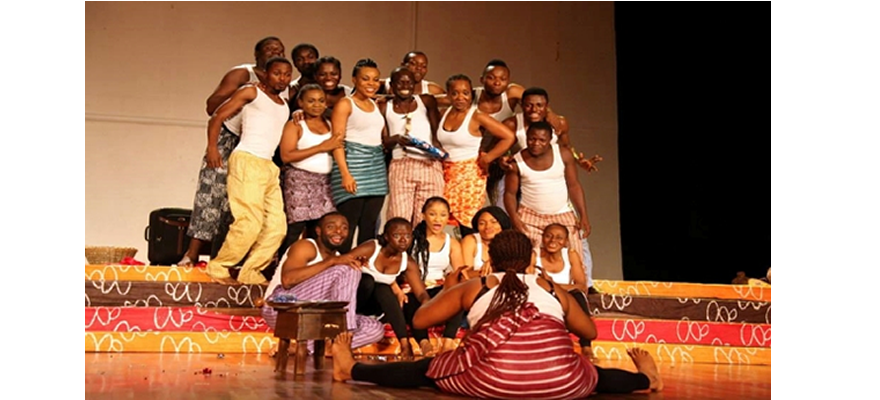A Beacon of Hope for Nigerian Book Lovers: The Ake Festival - by Kenechi Uzochukwu
The cast of "The Secret Lives of Baba Segi's Wives" on stage at the Ake Festival
There is hope yet for Nigerian literature. In the month of November alone, four largely successful book festivals took place across the country. There was the Garden City Literary Festival in Port Harcourt (the 2014 UNESCO World Book Capital), Enugu's Coal City Book Convention, the Lagos Book and Arts Festival, and the Ake Book and Arts Festival. At all of these festivals there was a throng of books and book lovers, proving that writers are writing and Nigerians are reading.
The last of these festivals, the Ake Book and Arts Festival, took place at the June 12 Cultural Centre in Kuto, Abeokuta. During the course of the event, the centre saw more visitors and heard more foreign accents than ever before. Ogun State is the home of hills and rocks, of which Olumo is the best known. The state is also home to other kinds of rocks: Wole Soyinka, the Kuti family, M.K.O. Abiola, Olusegun Obasanjo. The Ake Festival brought yet more rocks – literary rocks – to Abeokuta: Caine Prize winners Rotimi Babatunde and Tope Folarin; actors such as Adepero Oduye (12 Years a Slave); Nollywood film director Charles Novia; writers A. Igoni Barrett, Teju Cole, Pius Adesanmi, Marlon James, Christie Watson, Syl Cheney-Coker, Eghosa Imasuen, Chibundu Onuzo, Muthoni Garland, Binyavanga Wainaina, Ayesha Pande, Line Hoven, Ikhide Ikheloa, Alan Bissett, Doreen Biangana, Chuma Nwokolo, Ifeanyi Ajaegbo, and Lesley Lokko.
The Ake Festival began as an idea in the mind of Nigerian writer Lola Shoneyin. She was supported by Nigerian writers who heeded her call to volunteer their time and minds for the Festival. The Ogun State governor and Deputy Governor attended, Ekiti State sponsored students who wanted to make the trip to Abeokuta, and other states helped Lola Shoneyin’s vision move from potentiality to actuality. If the Nigerian government and people, who have been accused of a lack of interest in the literary arts, could come out in support for a book and arts festival, then there is indeed hope for our country. Guests were not disappointed. There was a tangible joy in the expressions of all who were present. There were no lows in the stream of activities at the Ake Festival. Nigeria's Nobel Laureate Wole Soyinka brought much humour to the events, especially during his interactive session with the audience after the performance of an excerpt of his play Alapata Apata. Another highlight involving Soyinka at the festival were his replies to four undergraduate students who were given the opportunity to interview him, filled with witty remarks such as
“I am against liquor. Wine is not liquor, gin is not liquor, a single malt brandy is not liquor. Palm wine is not liquor. All the rest are liquor. I don’t understand how people get inspired by drinking…orange juice…pineapple juice….carrot juice…”
Wole Soyinka interacting with the audience
The panel discussions were thought-provoking and affirming. The state of the Nigerian publishing sector and the need for Nigerian writers to improve their craft was a recurring theme for Nigerian participants. Visitors from Kenya, South Africa, Ghana, and other African nations present found the complaints rather surprising as for many of them, Nigerian writing was a beacon of hope. If Nigerians are complaining about the quality of their writers and writing – which other parts of the world admire – then indeed there is much to look forward to. Certain sexual scenes in the stage adaptation of The Secret Lives of Baba Segi’s Wives threw the viewing audience into an uproar of mixed reactions. The play, adapted for stage by 2012 Caine Prize winner Rotimi Babatunde and directed by Femi Elufowoju Jr, was the second unconventional but necessary exposition at the festival. The other – at least by Nigerian standards – was the screening of the film Pariah which featured Adepero Oduye as lead actress. The movie was a bold statement on societal and family dysfunction. It dwelt on homosexuality and the effects of human intolerance and a lack of empathy for those who are perceived to be different. There were workshops and art exhibitions; there were book chats and readings. Publishers sold out their stock, readers met favourite writers, and important connections were established. The Ake Festival’s supporters and sponsors – which included the World Bank, Etisalat, the Miles Morland Foundation, Goethe Institute, and Shehu Musa Yar’ Adua Foundation – should be proud of what their investments produced. It was a festival of minds, books, arts – and palm wine too, as everyone discovered on the last day of Ake Festival, the Palm Wine and Poetry Night. The drink was a muse, unlocking higher realms of creative abilities as the poets – Efe Paul Azino, Iquo Diana Abasi Eke, Natalia Molebasi, Wana Udobong and others – enthralled the audience with spoken word performances. No one wanted to leave. But it had to end sometime. And even as people swayed out of the venue reluctantly, in the early hours of the morning, there was hope in the hearts of all: for life, for knowledge, for literature. Next year, everyone promised, we would be back and better.





